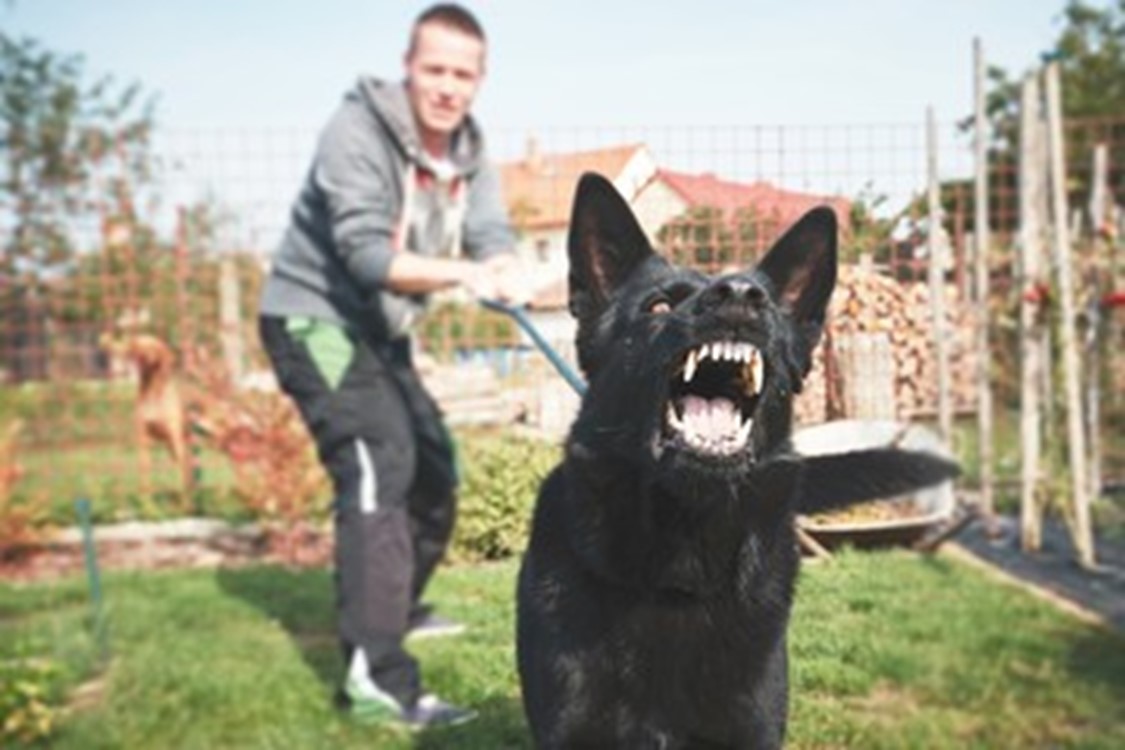Homeowner’s Insurance is meant to provide financial protection in the case of unexpected events. If your dog were to bite someone who does not live in the home with you, like a friend or neighbor, the liability coverage on your homeowner’s insurance policy may extend coverage to help cover the claimant’s medical costs, in the event you are found legally responsible for their injuries. Some homeowner’s insurance policies do not apply to certain breeds of dogs (pit bulls, rottweilers, etc.). Other insurance companies offering homeowners insurance policies may look at each dog on a case-by-case basis and determine if the dog is dangerous.
If a claimant has minor injuries, the medical payments coverage contained in your homeowner’s insurance policy could be accessed to compensate the claimant for medical bills they accrued anywhere from $1,000 to $5,000 depending on the specific terms of your policy. Some insurance companies may even cover psychological counseling for the claimant, if they suffered trauma as a result of the dog bit. If the claimant’s alleged injuries exceed the limitations set forth in the medical payment’s coverage of your homeowner’s insurance policy, then your personal liability coverage may be triggered. With much higher limits, usually ranging from $100,000 to $500,000, personal liability insurance has a greater capacity to help resolve high-cost claims, especially if there are multiple claimants involved.
When Does Homeowner’s Insurance Cover Dog Bites
Dog bite liability insurance coverage can be accessed to help pay for claims alleging bodily injury and/or property damage to another party. Below are some common dog bite situations where your homeowner’s insurance policy could be accessed by a claimant.
- Your dog bites a guest: The medical payments or liability coverage portion of your homeowner’s insurance policy could be utilized to pay for related expenses, in the event your dog bites a guest in your home or property and that bite results in an injury, or injuries. Your policy may also cover legal fees, in the event a claim cannot be resolved via settlement and escalates to litigation.
- Your dog bites someone away from your home: Standard homeowner’s insurance coverage will generally extend to dog bites that occur away from your property. However, some policies may limit coverage to incidents happening on your premises. This is why you need to make sure you review your homeowner’s insurance policy and check with your insurer.
- Your dog causes damage to a third party’s property: Dog liability insurance coverage may also apply to incidents wherein your dog tampered with, or damaged, someone else’s belongings, including personal items.
- Your dog bites another dog: Homeowner’s insurance policies may also cover related expenses if your dog bites another dog not living in your household.
When Does Homeowner’s Insurance Not Cover Dog Bites
Below are some scenarios in which your homeowner’s insurance company may refuse to cover, or contest, a dog bite injury claim.
- You have prior claims for dog bites involving the same dog: If your dog was initially covered, but multiple claims have been filed for incidents involving the same dog biting people, then your homeowner’s insurance company may decide to refuse coverage for future claims.
- Your dog is on the list of excluded breeds: Insurance companies often maintain a list of breeds considered of “high risk” for aggressive behavior and exclude them from coverage.
- You did not disclose your ownership of a dog, or dogs, to your insurance company: When you apply for homeowner’s insurance, the company will typically ask if you own a dog and, if so, what breed. If you failed to disclose that you own a dog, or dogs, or were not truthful about the breed, then claims related to a dog bite injury could be denied.
- You intended for your dog to bite another person: If you intentionally provoked your dog to bite someone or were otherwise involved in creating the circumstances leading to the bite, your claim would likely be denied (meaning you could be held personally liable for the dog bite claimant’s injuries).
- Your dog bit you or somebody else living inside your home: In general, homeowner’s insurance will not cover any injuries to household members. You will need to rely on your health insurance for coverage.
- A dog bite claim exceeded your policy’s limits: Most homeowner’s insurance policies have a cap on liability coverage. If the claim seeks an amount in excess of your insurance coverage, there is the possibility you could be held responsible for the difference. Whether the claim will hit the cap on liability coverage typically depends on the amount of medical bills, legal fees and any settlements or judgments from a dog bite.
Does Renter’s Insurance Cover Dog Bites?
Renter’s insurance, like homeowner’s insurance, covers dog bites as well. You may want to pay special attention to the conditions of your policy when it comes to renter’s insurance. Unlike homeowner’s insurance, renter’s insurance protection may be confined to the walls of your apartment or the complex. That means if you are taking your dog out for a walk, your renter’s insurance policy likely will not cover you for liability in the event your dog bites someone while beyond the confines of your residence or apartment complex. Of course, this can vary from insurance company to insurance company, so call your insurance provider if you are unsure of the limits of your policy.
Which Breeds Are Excluded From Coverage?
Within most insurance companies, specific breeds are excluded from homeowner’s insurance because they are considered possibly dangerous. Some of these breeds are:
- Pit Bull
- Siberian Husky
- Rottweiler
- Staffordshire Terrier
- Chow Chow
- Mastiff
- Presa Canario
- Great Dane
- Akita
- Doberman Pinscher
The excluded breeds will depend on the insurance company, while some may not have any exclusions. Some companies might even evaluate your pet to see if they can provide animal liability coverage or not. They will commonly check your dog’s biting history as well.
State Laws Limiting Breed Restrictions
Some states have laws that prevent dog breed restrictions in homeowner insurance coverage. Insurance coverage issues are generally resolved by contract law. Courts look at the policy terms. However, states do regulate insurance companies. It is important to their citizen’s public interest. Critics say breed discrimination is inaccurate and unclear since the type of dog is difficult to determine. This is especially true for mixed-breed dogs. Some states, like Michigan, Illinois, Nevada, New York, and Pennsylvania agree. These states have specific laws that prevent dog breed restrictions in homeowner’s insurance policies. Other states prohibit municipal breed bans on a city level. This is to combat breed-specific legislation. It means a state does not allow a city to ban specific breeds. Arizona and Connecticut are two states to do this. The Fair Housing Act (FHA) federally prohibits dog breed surcharges for assistance animals. That law applies to homeowner insurance and renter’s insurance.
Understand Your State’s Dog Liability Laws
Most states implement one of three types of liability laws for dog bites:
- Dog bite statutes: In states with specific dog bite statutes, you would be at risk of being held liable for any type of injury or property damage your dog causes, based upon the scope and language of the applicable dog bite statute. Although many of these state laws refer to dog bites, they generally include all types of dog-inflicted injuries. This means if your dog bites someone, the bitten party can file a claim against you in civil court seeking monetary damages.
- One-bite rule: In a state that adheres to the “one bite” rule, you would only be legally responsible for an injury caused by your dog if the claimant has evidence that you knew, beforehand, that your dog was aggressive or prone to causing injury. If this is your dog’s first bite and there is no history of your dog acting aggressively, then there is a possibility you may not be held liable in a dog bite injury claim.
- Negligence laws: In states that adhere to standard, or traditional, negligence theory, then you would only be at risk of being held liable if the claimant’s attorney can prove, by a preponderance of the evidence, that you acted negligently or carelessly (e.g., not taking proper steps to control your dog) and that negligence or carelessness proximately resulted in the dog bite injury.



